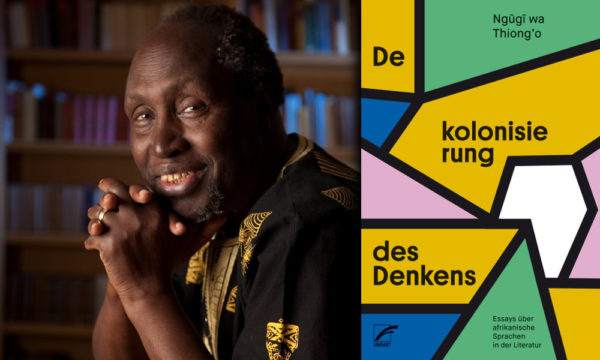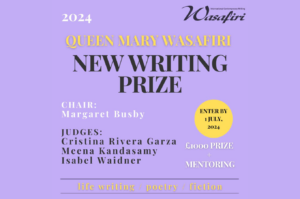
Dekolonisierung des Denkens, the new German edition of Ngugi’s iconic collection of essays, Decolonising the Mind, is coming with something major: five afterwords by five African writers from different countries—Zimbabwe’s Petina Gappah, South Africa’s Sonwabiso Ngcowa, Senegal’s Boubacar Boris Diop, Cameroon’s Achille Mbembe, and Kenya’s Mukoma wa Ngugi. The collection is translated from the English by Thomas Brückner and was published in October 2017 by Unrast Verlag.

Petina Gappah’s afterword recently appeared as an exclusive in The Johannesburg Review of Books. In it, she discusses Ngugi’s influence on her and her relationship with his proposal of language change.
I had the great privilege to meet Ngũgĩ in 2012 at the Gothenburg Book Festival, where more than sixty writers from across the continent of Africa were guests of honour. I had long been an admirer of his fiction, from the time I read his moving novel The River Between as a schoolgirl in Harare, but it was his polemical work Decolonising the Mind that had the greatest impact on me.
I first read Decolonising the Mind in 1995. I was a postgraduate student in Austria, writing my Doktorarbeit at the Institut für Völkerrecht at the Rechtswissenschaften Fakultät at the University of Graz. Bored out of my mind by my thesis in trade law, I took solace in my real love, which was reading. I haunted the library of the Institut für Anglistik und Amerikanistik, and borrowed books by the bucketload. It was there, in the middle of my first Austrian winter, that I read Decolonising the Mind.
As I would tell Ngũgĩ when I met him in Gothenburg many years later, the book had a deeply profound effect on me—one that was both uplifting and debilitating. His central and irrefutable argument is that Africans have experienced two forms of colonisation: that of their land and of their minds. With every African state now independent, the colonisation of the land is over. What remains is the debilitating colonisation of the mind, which makes colonisation permanent long after its physical aspects end. For what the coloniser achieved was to separate the African from the language of his culture and community by inculcating in him the belief that the language of his education was not only superior, but also the means of his civilisation.
Ngũgĩ’s response to that process is to assert the dignity of African languages as a method of instruction and as a means of writing and seeing the world, to assert once and for all the relevance of our languages, and in that way to bring back the disrupted harmony between language and world-view. The book concludes with a declaration that was, as his consistency and commitment have proven, both a programme of action and a call to arms: From now on it is Gĩkũyũ and Kiswahili all the way!
It seemed to me when I read Decolonising the Mind that Ngũgĩ had looked into my education and written about me. For the experience he narrates of his education in Kenya in the nineteen-fifties was the same story I experienced in Zimbabwe in the nineteen-eighties and nineteen-nineties.
Read the full essay HERE.









Eddie Hewitt November 13, 2017 18:30
I am struggling a bit with this. I am also running the risk of showing my ignorance, but if it's not too late to post this reply I trust you will endeavour to help me out. First, I have just ordered a copy of Decolonising the Mind. I have meant to for some time, and have been hastened along by Petina Gappah's essay. Next, I am also assuming that Decolonising the Mind was originally written in English. If it was written in Gĩkũyũ or Kiswahili I really am in trouble, with the book and with my response here. So, my question is: Do you see any problem in Ngugi Wa Thiong'o extolling the virtues of writing in native African languages in a book which he wrote in the very language that was such a prominent part of the decolonisation (English) ? Also, surely the impact / readership of his discourse would have been far less widespread had it been written in Gĩkũyũ or Kiswahili? Would Petina ever have read it if it had been written in a Kenyan language? Finally, I note that the new version is in German. Isn't there even more of a problem in that this version is a translation into another European language, another step further away again? I hope you can set me straight on these points. Best regards, Eddie ps - I am a big fan of Petina's writing and I learnt a lot from reading A Grain of Wheat. Maybe not enough, I fear.